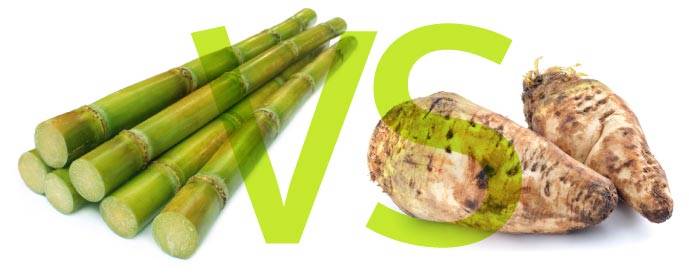A Detailed Overview of the Health and Economic Effects of Cane Sugar Processing on Regional Areas
Cane sugar processing plays an essential duty fit the economic landscape of local neighborhoods, using employment possibility and stimulating supplementary markets. Nevertheless, the wellness implications linked with high sugar consumption can not be neglected, as they contribute to rising rates of obesity and diabetes mellitus. This nuanced vibrant welcomes a crucial exam of just how neighborhoods can maximize economic gains while resolving the pushing health challenges they encounter. The expedition of instructional efforts and sustainable practices might simply hold the trick to integrating these contrasting rate of interests. What methods might neighborhoods execute to achieve this equilibrium?
Financial Benefits of Walking Cane Sugar Processing
Walking cane sugar handling offers considerable economic advantages that extend beyond the prompt agricultural sector. The cultivation and processing of sugarcane develop many task chances, from farming to manufacturing and distribution. This work generation not just sustains neighborhood economic situations yet likewise fosters area growth by supplying stable income sources for households.
Additionally, the sugar industry stimulates ancillary services, consisting of transport, equipment supply, and packaging solutions (Cane Sugar Processing). As these sectors expand, they add to a more robust financial structure, improving overall area durability. The export capacity of refined walking cane sugar further magnifies financial benefits, positioning areas as competitive gamers in worldwide markets
Investment in contemporary handling centers can lead to boosted performance and performance, thus lowering waste and maximizing resource usage. This shift not only benefits the regional economic situation but also supports sustainability efforts by lessening ecological impacts.
Additionally, the earnings generated from walking stick sugar handling can be reinvested in local infrastructure, education and learning, and health care, advertising all natural community development. Overall, the economic benefits of cane sugar processing are complex, offering a structure for withstanding prosperity in farming regions.
Wellness Threats Connected With Sugar Consumption
Too much sugar usage positions substantial health and wellness risks that necessitate major focus. High intake of included sugars, especially from processed beverages and foods, has been connected to various wellness problems.
In addition, high sugar usage is connected with cardiovascular condition. Elevated blood glucose degrees can result in insulin resistance, a forerunner to various heart-related problems. In addition, sugar can have harmful results on oral health and wellness, causing cavities and gum tissue disease, as bacteria in the mouth flourish on sugar, generating acids that wear down tooth enamel.
Moreover, emerging research suggests a potential web link between high sugar usage and psychological wellness disorders, such as anxiety and stress and anxiety. As communities grapple with these wellness dangers, it becomes necessary to advertise awareness and urge healthier nutritional selections. Addressing sugar consumption is vital not only for individual health and wellness but additionally for the general wellness of regional areas, stressing the need for thorough public wellness strategies.
Environmental Influences of Sugar Manufacturing
Frequently forgotten in discussions regarding sugar's implications is the substantial environmental impact of sugar production. The farming of sugarcane frequently demands considerable land use, causing deforestation, loss of biodiversity, and interruption of regional environments. The conversion of woodlands and marshes into sugar vineyards can result in habitat devastation, threatening numerous types and modifying eco-friendly balance.
Additionally, sugar manufacturing is resource-intensive, consuming substantial quantities of water for watering. This can result in depletion of regional water resources, negatively impacting both farming methods and area accessibility to clean water. In addition, the usage of chemical plant foods and pesticides in sugarcane farming can add to soil destruction and water air pollution, as runoff from these chemicals goes into nearby rivers and lakes, influencing marine life and human health.
The ecological impact reaches the processing phase, where power intake and waste generation additional aggravate ecological issues. Air contamination from burning sugarcane fields, in addition to greenhouse gas exhausts, contribute to climate change. Thus, the ecological ramifications of sugar production warrant significant factor to consider, advising stakeholders to adopt more sustainable techniques to minimize these negative results on regional ecological communities and areas.
Job Development and Neighborhood Growth
The environmental obstacles presented by sugar production are commonly counterbalanced by its capacity for financial advantages, specifically in job creation and community development. The walking cane sugar sector offers as a significant resource of employment in several backwoods, supplying work throughout numerous ability degrees, from agricultural labor to handling and distribution functions. This employment not only supports private family members yet additionally contributes to the overall financial vitality of local neighborhoods.
Furthermore, the facility of sugar processing facilities boosts secondary look at more info organizations, such as transport services, devices supply, and maintenance companies. As these organizations thrive, they develop additional work and bolster local economic situations. The earnings created from the sugar market also causes raised tax profits, which can be reinvested into social work such as medical care, education, and facilities advancement.
In addition, the sugar industry commonly involves in community advancement efforts, such as supporting local schools and wellness programs, consequently improving the quality of life for residents. By promoting solid community ties and advertising economic growth, the walking cane sugar processing field plays an essential function in uplifting local populations, making it a vital component of sustainable development strategies in sugar-producing regions.
Balancing Wellness and Economic Growth
In browsing the complexities of walking cane sugar handling, an important difficulty lies in balancing health and wellness factors to consider with financial growth. The sugar market significantly adds to local economies by generating tasks, promoting relevant sectors, and raising tax revenues. However, the health and wellness ramifications related to too much sugar usage can bring about persistent conditions such as weight problems, diabetic issues, and cardiovascular problems, which can concern public wellness systems and diminish labor force efficiency.

Additionally, regulatory structures can play a pivotal function in assisting sector practices towards more health-conscious and lasting techniques. By fostering partnership between government bodies, wellness organizations, and the sugar market, areas can browse the duality of health and wellness and financial growth, guaranteeing that the benefits of walking cane sugar processing are equitably shared while focusing on public health and wellness.
Final Thought
In final thought, the processing of walking stick sugar offers both significant economic advantages and notable health threats for local communities. While it promotes work production and stimulates regional advancement, the affiliated health and wellness issues, particularly read more relating to weight problems and diabetes mellitus, necessitate a cautious balancing act. By promoting responsible intake and investing in area education and learning and sustainable techniques, it is possible to maximize economic benefits while decreasing unfavorable health and wellness impacts, thus making certain a much healthier future for regional populations.
In addition, sugar can have damaging impacts on dental wellness, resulting in tooth cavities check this and gum tissue disease, as germs in the mouth grow on sugar, producing acids that erode tooth enamel.
Attending to sugar consumption is crucial not just for specific health and wellness yet likewise for the total well-being of regional communities, stressing the demand for detailed public health strategies.
Often neglected in conversations concerning sugar's implications is the considerable environmental effect of sugar manufacturing. The wellness effects linked with excessive sugar intake can lead to persistent illness such as excessive weight, diabetes mellitus, and cardio issues, which can concern public health systems and lessen labor force productivity.
